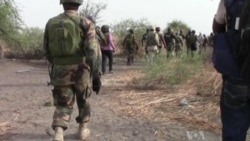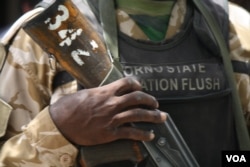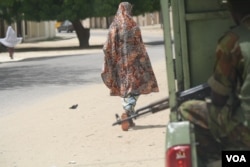BORNO STATE, NIGERIA —
In the three and a half weeks since Nigerian President Goodluck Jonathan declared a state of emergency in three northeastern states, thousands of troops have been deployed and the military says it has cleared out several camps belonging to the militant group Boko Haram. For the first time since all this began, journalists were allowed to visit the battle zone this week, including Heather Murdock who filed this story for VOA.
We enter the military plane from a ramp in the back and once on board, we write our names on the handwritten manifest, hoping this trip to northern Nigeria will answer a lot of questions.
Are Boko Haram insurgents still strong in northern Nigeria? Are there as few military casualties as they say? Have civilians been killed?
At an impromptu prss conference, Brigadier General Chris Olukolade says definitively that civilians have not been killed, despite accusations from international organizations that Nigerian security forces are prone to shoot before arresting, and to make arrests without charges or trials.
“Anyone that was killed in a camp cannot call themselves a civilian. Most of the camps are populated definitely by terrorists and they’re the objects of this operation.”
Other questions he says he cannot answer, like how many soldiers or insurgents have been killed.
“The operation is still on and the information is being collated," he said. "In many of the locations we are still mopping up and until we finish mopping up it is wrong to give you any inaccurate figure because we know the implications of such figures to the international community.”
We do get a glimpse into what Nigerian soldiers are facing when they take us to a campsite outside the Kirenowa village.
Hours away from the nearest city and far from the nearest road, soldiers guard what they say once was a Boko Haram hideout, a hot dusty patch of brush where they found burnt out cars, medical supplies and discarded clothing.
“So this is where they keep their injured," said a lieutenant colonel, who gave the journalists a tour. "They keep their injured here. They treat them here. They have a medical doctor here. And from the size you can see they have a lot of injured here.”
Back at the base, soldiers say northern Nigeria is safe, or at least safer than it used to be. But the compound is heavily guarded and nearly everyone is wearing body armor.
After we leave the camp, the officers take us to Kirenowa, where locals gather at a military-led village assembly. One speaker points out that since farming was halted because of the offensive, they want the government or the international community to provide tractors so they don’t lose this year’s crops.
Ahmed, a resident, says he’s glad Boko Haram has left the area. He says in their fourth year of insurgency, Boko Haram militants had permeated his town and were killing some people and extorting money from others. But now, he says, they have other problems because their farms have been left untended.
“Here too we don’t have food. Any way we are getting the food is closed [off]. We don’t have enough food.”
Ahmed doesn’t appear to be intimidated by the nearby soldiers, but he does fall quiet as an officer comes close. Some soldiers say Boko Haram fled when the military moved into the area. Others say the militants were "armed to the teeth" and put up a fight.
At the base in Maiduguri, the Borno State capital and the heart of the insurgency, one officer shows us scores of weapons and vehicles. He says the military has captured them from Boko Haram and shows us anti-aircraft guns and a pickup truck with a mount for a machine gun.
Security forces say Boko Haram, which has been blamed for thousands of deaths and says it wants to impose a harsh version of Islamic law in the north, became increasingly violent in recent months, and by May was occupying towns and villages in Borno, Yobe and Adamawa States.
The military says it has captured hundreds of Boko Haram members since the offensive began, killed dozens more and retaken territories.
But on the first trip by journalists to the front, we were not able to visit hospitals, morgues or detention centers. And what people are facing in most of Nigeria's vast northeastern countryside largely remains unknown.
We enter the military plane from a ramp in the back and once on board, we write our names on the handwritten manifest, hoping this trip to northern Nigeria will answer a lot of questions.
Are Boko Haram insurgents still strong in northern Nigeria? Are there as few military casualties as they say? Have civilians been killed?
At an impromptu prss conference, Brigadier General Chris Olukolade says definitively that civilians have not been killed, despite accusations from international organizations that Nigerian security forces are prone to shoot before arresting, and to make arrests without charges or trials.
“Anyone that was killed in a camp cannot call themselves a civilian. Most of the camps are populated definitely by terrorists and they’re the objects of this operation.”
Other questions he says he cannot answer, like how many soldiers or insurgents have been killed.
“The operation is still on and the information is being collated," he said. "In many of the locations we are still mopping up and until we finish mopping up it is wrong to give you any inaccurate figure because we know the implications of such figures to the international community.”
We do get a glimpse into what Nigerian soldiers are facing when they take us to a campsite outside the Kirenowa village.
Hours away from the nearest city and far from the nearest road, soldiers guard what they say once was a Boko Haram hideout, a hot dusty patch of brush where they found burnt out cars, medical supplies and discarded clothing.
“So this is where they keep their injured," said a lieutenant colonel, who gave the journalists a tour. "They keep their injured here. They treat them here. They have a medical doctor here. And from the size you can see they have a lot of injured here.”
Back at the base, soldiers say northern Nigeria is safe, or at least safer than it used to be. But the compound is heavily guarded and nearly everyone is wearing body armor.
After we leave the camp, the officers take us to Kirenowa, where locals gather at a military-led village assembly. One speaker points out that since farming was halted because of the offensive, they want the government or the international community to provide tractors so they don’t lose this year’s crops.
Ahmed, a resident, says he’s glad Boko Haram has left the area. He says in their fourth year of insurgency, Boko Haram militants had permeated his town and were killing some people and extorting money from others. But now, he says, they have other problems because their farms have been left untended.
“Here too we don’t have food. Any way we are getting the food is closed [off]. We don’t have enough food.”
Ahmed doesn’t appear to be intimidated by the nearby soldiers, but he does fall quiet as an officer comes close. Some soldiers say Boko Haram fled when the military moved into the area. Others say the militants were "armed to the teeth" and put up a fight.
At the base in Maiduguri, the Borno State capital and the heart of the insurgency, one officer shows us scores of weapons and vehicles. He says the military has captured them from Boko Haram and shows us anti-aircraft guns and a pickup truck with a mount for a machine gun.
Security forces say Boko Haram, which has been blamed for thousands of deaths and says it wants to impose a harsh version of Islamic law in the north, became increasingly violent in recent months, and by May was occupying towns and villages in Borno, Yobe and Adamawa States.
The military says it has captured hundreds of Boko Haram members since the offensive began, killed dozens more and retaken territories.
But on the first trip by journalists to the front, we were not able to visit hospitals, morgues or detention centers. And what people are facing in most of Nigeria's vast northeastern countryside largely remains unknown.















